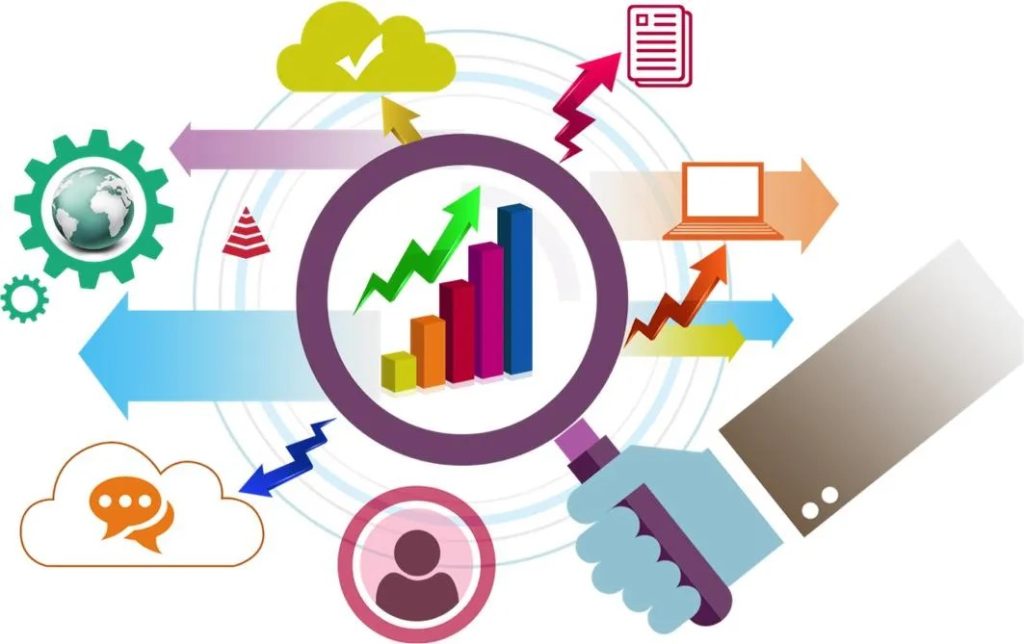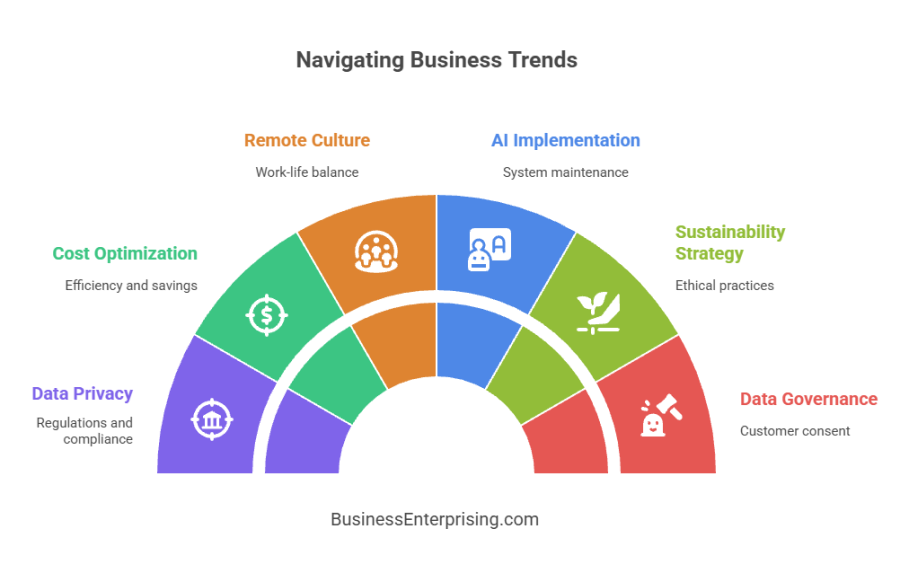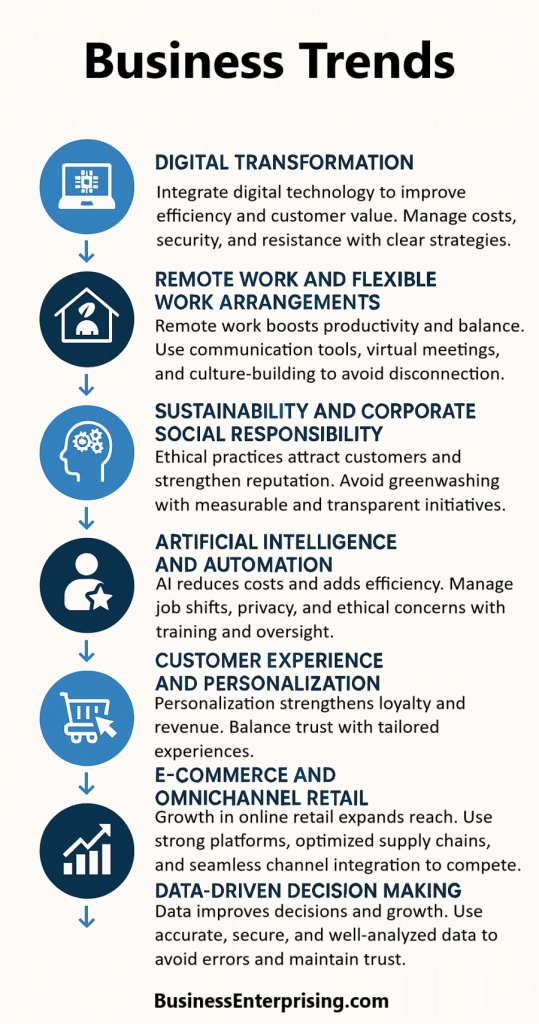 In the ever-evolving landscape of modern business, staying ahead of trends is crucial for maintaining competitiveness and fostering growth. Understanding and adapting to these trends can open new opportunities and drive innovation. However, embracing business trends without adequate preparation can lead to unforeseen challenges and potential failures. Let’s explore current business trends, the risks associated with them, and strategies to mitigate these risks.
In the ever-evolving landscape of modern business, staying ahead of trends is crucial for maintaining competitiveness and fostering growth. Understanding and adapting to these trends can open new opportunities and drive innovation. However, embracing business trends without adequate preparation can lead to unforeseen challenges and potential failures. Let’s explore current business trends, the risks associated with them, and strategies to mitigate these risks.
Digital Transformation
One of the most significant business trends is digital transformation. This involves integrating digital technology into all areas of a business. This transformation fundamentally changes how businesses operate and deliver value to customers. While digital transformation offers numerous benefits, such as improved efficiency, enhanced customer experiences, and new business models, it also presents several risks. Companies may face high implementation costs, data security issues, and resistance to change from employees.
To avoid these problems, businesses should start with a clear digital transformation strategy that aligns with their overall business goals. This strategy should include a comprehensive assessment of current processes and technology infrastructure. Additionally, investing in robust cybersecurity measures is essential to protect sensitive data and build customer trust. Engaging employees through training and involving them in the transformation process can also reduce resistance and foster a culture of innovation. Regularly reviewing and adjusting the strategy ensures that the digital transformation efforts remain aligned with the company’s objectives and market changes.
Remote Work and Flexible Work Arrangements
The COVID-19 pandemic has accelerated the adoption of remote work and flexible work arrangements. While these trends offer benefits such as increased productivity, cost savings, and improved work-life balance, they also come with challenges. Managing a remote workforce can lead to communication barriers, feelings of isolation among employees, and difficulties in maintaining a cohesive company culture.
To address these issues, companies should invest in reliable communication and collaboration tools that facilitate seamless interaction among remote employees. Establishing clear communication protocols and regular virtual meetings can help maintain connectivity and teamwork. Additionally, fostering a strong company culture in a remote environment requires intentional efforts, such as virtual team-building activities and regular feedback sessions. Providing support for employees’ mental health and well-being is also crucial to prevent feelings of isolation and burnout.
Sustainability and Corporate Social Responsibility
Sustainability and corporate social responsibility (CSR) are becoming increasingly important for businesses as consumers demand more ethical and environmentally friendly practices. Embracing these trends can enhance a company’s reputation, attract customers, and drive long-term success. However, implementing sustainable practices and CSR initiatives can be complex and costly, and businesses risk being accused of “greenwashing” if their efforts are perceived as insincere or superficial.
To avoid these pitfalls, businesses should develop a genuine and transparent sustainability strategy. This strategy should include clear goals, measurable targets, and regular reporting on progress. Engaging stakeholders, including customers, employees, and investors, in the development and execution of sustainability initiatives can build trust and credibility. Additionally, businesses should integrate sustainability into their core operations rather than treating it as a separate or secondary initiative. By doing so, they can ensure that their efforts are impactful and aligned with their long-term objectives.
Artificial Intelligence and Automation
Artificial intelligence (AI) and automation are transforming industries by enhancing efficiency, reducing costs, and enabling new capabilities. However, implementing AI and automation technologies can be challenging and may lead to job displacement, data privacy concerns, and reliance on complex systems that require ongoing maintenance and updates.
To successfully leverage AI and automation, businesses should start with a clear understanding of their specific needs and goals. Conducting pilot projects can help assess the feasibility and impact of these technologies before scaling them across the organization. Additionally, investing in employee training and upskilling programs can mitigate the risk of job displacement by preparing the workforce for new roles and responsibilities. Addressing data privacy and ethical considerations is also crucial to ensure compliance with regulations and maintain customer trust.
Customer Experience and Personalization
Enhancing customer experience and personalization is a key trend driven by advances in data analytics and consumer expectations. Businesses that excel in this area can build stronger customer relationships, increase loyalty, and drive revenue growth. However, collecting and using customer data for personalization poses privacy risks and can lead to negative customer perceptions if not handled carefully.
To effectively implement personalization strategies, businesses should prioritize data privacy and transparency. Obtaining explicit customer consent and providing clear information on how their data will be used can build trust and enhance the customer experience. Leveraging advanced analytics and AI can help deliver personalized experiences without compromising privacy. Additionally, businesses should continuously monitor and evaluate their personalization efforts to ensure they meet customer needs and preferences.
E-commerce and Omnichannel Retail
The rapid growth of e-commerce and omnichannel retail has reshaped the retail landscape. While these trends offer significant opportunities for reaching a broader audience and enhancing customer convenience, they also present challenges such as increased competition, supply chain complexities, and the need for seamless integration across channels.
To succeed in e-commerce and omnichannel retail, businesses should invest in robust e-commerce platforms that offer a seamless shopping experience. Optimizing supply chain operations through advanced analytics and real-time tracking can enhance efficiency and meet customer expectations. Additionally, integrating online and offline channels to provide a consistent and personalized experience is crucial for customer satisfaction. By leveraging data and technology, businesses can stay competitive and capitalize on the growing demand for e-commerce and omnichannel retail.
Data-Driven Decision Making
Data-driven decision making is becoming increasingly important for businesses seeking to optimize operations, enhance customer experiences, and drive growth. However, relying on data without proper analysis and interpretation can lead to flawed decisions and missed opportunities. Additionally, businesses must ensure data accuracy and address privacy concerns.
To harness the power of data-driven decision making, businesses should invest in advanced analytics tools and technologies that provide actionable insights. Building a data-driven culture involves training employees to understand and use data effectively in their decision-making processes. Ensuring data quality and accuracy through regular audits and validation is also essential. Addressing data privacy concerns by complying with regulations and implementing robust security measures can maintain customer trust and protect sensitive information.
Conclusion
Embracing business trends is essential for staying competitive and driving growth in today’s dynamic environment. However, these trends come with their own set of challenges and risks. By understanding potential pitfalls and implementing strategies to mitigate them, businesses can successfully navigate these trends and achieve their goals.
In conclusion, the key to leveraging business trends lies in thorough preparation, continuous monitoring, and adapting strategies to evolving market conditions. Whether it is digital transformation, remote work, sustainability, AI, customer experience, e-commerce, or data-driven decision making, businesses must approach these trends with a clear vision and a proactive mindset. By doing so, they can capitalize on opportunities, overcome challenges, and build a resilient and future-ready organization.


